#tpaalha
Note
I would kill to see some pictures of random pages, any pages, however mundane, of your notebooks, journals, sketchbooks etc etc. It drives me absolutely wild to see the inner workings of fascinating people's minds (such as yours) through the window of the marks they leave on paper as they go about their business.
You're the boss!
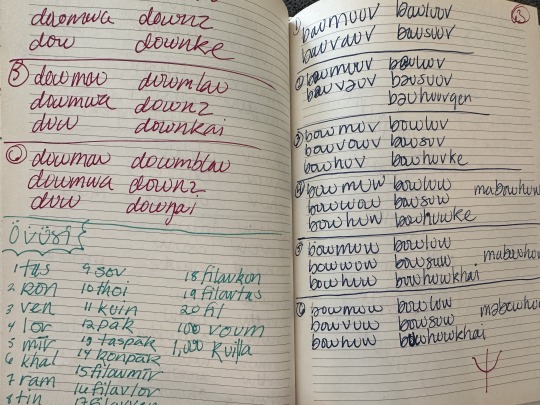
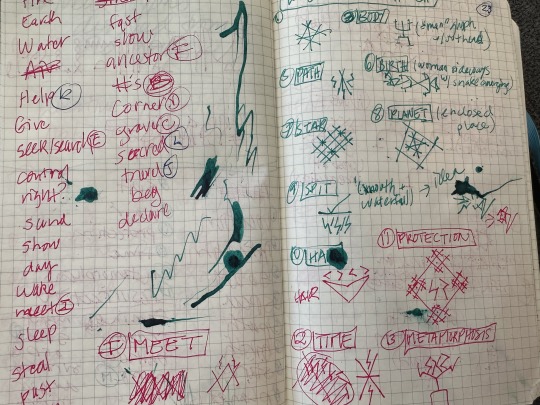
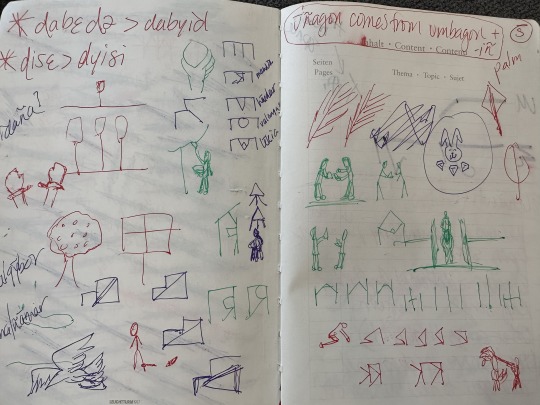
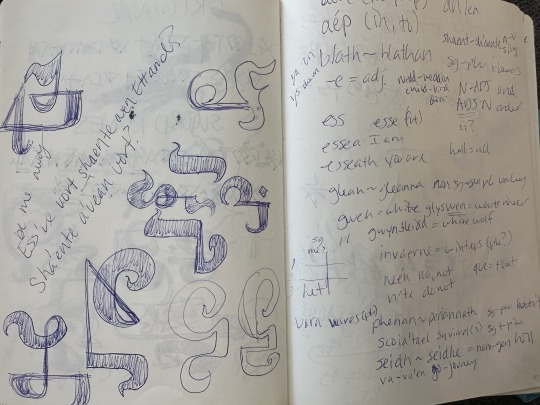
#conlang#high valyrian#valyrian#övüsi#mlp#tpaalha#language of adam#hen linge#something else I don't recognize#orthography#conscript#neography
94 notes
·
View notes
Text
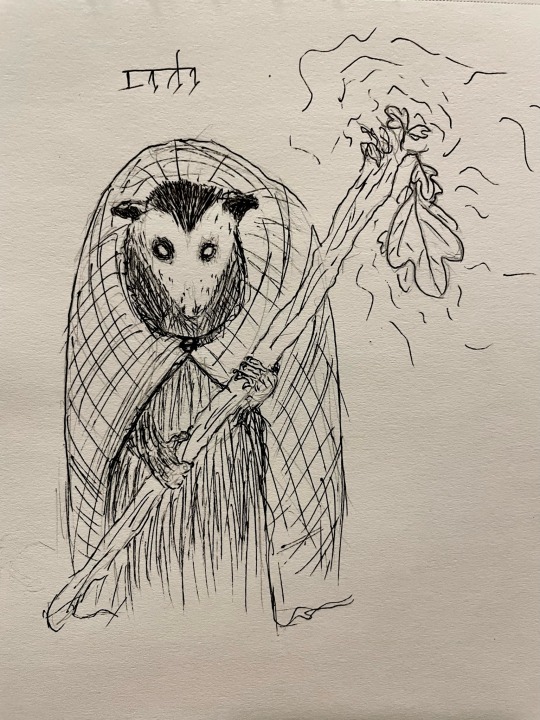
KNAAN wizard
(an opossum of @langtimestudio’s Tpaalha)
13 notes
·
View notes
Note
welcome back! i’ve really been enjoying langtime studio. it’s been really inspirational for my own conlanging, both regarding the linguistics stuff you guys use as well as your general workflow
Thank you! That was the hope.
For those unfamiliar, LangTime Studio is a joint project by me and Jessie Sams (@quothalinguist). Jessie and I created the Méníshè language for Motherland: Fort Salem, and we loved working together so much that we wanted something else to do in the downtime between that first season and a potential season 2 (which was no guarantee, at the time). I couldn't wait for some other job to come along, so I decided to do something with a project I'd been neglecting.
For a long time, I've wanted to do something that was essentially a board game version of the Sega Genesis game Shining Force (for newer gamers, it's like proto-Fire Emblem, but better). I wanted to set it in a post-human Earth featuring anthropomorphic animals (mutated somewhat like the Teenage Mutant Ninja Turtles), and I wanted them all to speak their own languages. They'd have absolutely no connection to previous human languages, just as they'd have no connection to previous human culture. In order to have any characters in this game, I'd have to create actual languages to draw names from, and I kept stalling.
Originally my plan was to "upgrade" my old languages. I was goingj to have five different anthropomorphic species, and I was going to take the following languages and redo them, bringing them up to my current standard:
Cats: Zhyler
Rabbits: Kamakawi
Opossums: Sidaan
Dogs: Gweydr
Mice: Njaama
I even started with Zhyler (I have a tiny little document called New Zhüler on my computer), but there was just too much to change... It ripped the heart and soul out of the original projects, and the new versions simply weren't as good as I wanted them to be.
Then I hit an idea that combined this idea with one I'd had earlier (to wit: Some famous author could set up a subscription service where essentially they write their new novel on, like, Google Docs, and they let people watch literally while they write). What if Jessie and I created these languages together, and did it on YouTube, and then started a Patreon to justify the work hours we were putting into it?
And this is where LangTime Studio was born. Jessie and I worked together to come up with the details, and ultimately we decided we'd stream every Thursday at 2 p.m. Pacific. We've been doing it now since February of 2020, and we've worked our way through the languages for the rabbits, opossums, and mice, and we're nearing completion on our cat language. Only the dog language remains!
I'd always hoped that anyone could pop in at any time and not have to be there from the beginning of the season. I mean, if you're watching Bob Ross, it's fascinating to see him start from a totally blank canvas, but if he's already got a sky, ground, and a mountain on there, it's not like you turn it off. It's still fun to see a happy little tree come into being!
Most of the time it looks like this:
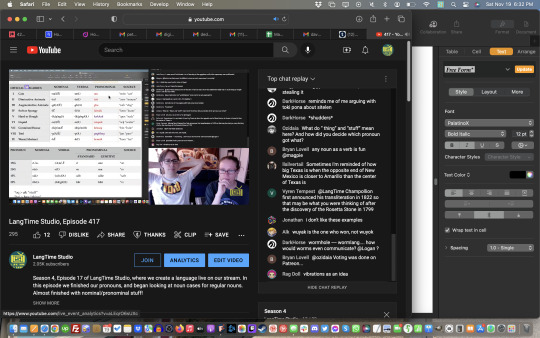
That is, Jessie and I spend a lot of time to thinking and trying to figure out what to do next, and people watch and chat and give us ideas, answer questions, etc.
It's been a fun Thursday tradition for us for what's coming on three years now, and we're looking to keep going!
So that's partly what we've been up to. We didn't know how well we'd be able to keep it up with my travel schedule, but you'll notice this started in February of 2020. February 27th, in fact. I actually did have a talk in between then and the total lockdown which put our second episode on a Wednesday. The next talk I had was canceled. And the next one. And the next one. And the next one...
Of course, catching a live stream isn't something everyone can do or wants to do, but hey, if you want to know what it's like for a conlanger to work on a language from absolute zero to fairly functional, this is it. I'd always hoped especially that beginning conlangers would find it inspiring and encouraging to see how utterly and completely lost we get—and how often it happens. Like anything else, you just gotta keep plugging away. :)
#conlang#language#archipithecus#lts#langtime#langtime studio#quothalinguist#engála#wokuthízhű#tpaalha#sarkezhe#méníshè#motherland#motherland fort salem#fort salem#switches
34 notes
·
View notes
Text
Hey, for those who are interested, @quothalinguist and I have opened a RedBubble store with products featuring our LangTime Studio languages, plus some of the other languages we've created for other projects (e.g. Defiance and Dune). Take a look! There's some stuff there we're pretty proud of. :)
#conlang#language#lts#langtime#langtime studio#thor#thor the dark world#shiväisith#dune#chakobsa#defiance#irathient#castithan#indojisnen#indogene#kinuk'aaz#omec#wokuthízhű#engála#tpaalha#sarkezhe
9 notes
·
View notes
Text
Today begins the sixth season of LangTime Studio!
LangTime Studio is a YouTube live streaming series where my wife Jessie (@quothalinguist) and I create a language for various anthropomorphic animals. These various animal kingdoms are combatants in a board game I'm creating called Sovála. During the first five seasons we've made the following languages:
Engála: A language for rabbits.
Tpaalha: A language for opossums.
Wokuthízhű: A language for mice.
Sarkezhe: A language for cats.
Haughòf: A language for dogs.
Today we start a new chapter as we create languages for the two new species introduced in the first Sovála expansion: Beavers and foxes. We don't know which language we'll be doing yet (that will be determined by a poll which ends shortly before the stream), but eventually we'll do both.
Our episodes are two hours long and stream every Thursday starting at 2:00 p.m. Pacific Time. Many watch live and participate in chat, but many also watch them after they're finished. A season usually lasts around 35 episodes before we move on to another language. The languages aren't done at that point, but they're done enough that we can use them for what we need them for in the game.
If you'd like to follow along, use the link above! And if you'd like to support us, you can either become a member of our YouTube channel, or join our Patreon. (We've also got a RedBubble store if you're a fan of Jessie's artwork and our writing systems.)
Stay grammar!
9 notes
·
View notes